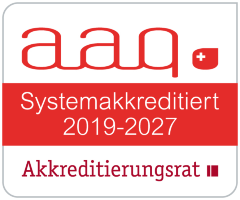
The Quality Development Unit (QE) is responsible for the implementation and further development of the Stuttgart Evaluation Model (SEM), a comprehensive quality management system in the field of teaching and learning. In addition, the QE's field of activity extends to consulting and concept development, as well as the management and implementation of strategically important projects in the area of quality development, for example university-wide, for central institutions or for externally funded projects.
Quality development in teaching and learning
In 2009, the University of Stuttgart began setting up a comprehensive quality management system for teaching and learning. In 2012, the system, the Stuttgart Evaluation Model (SEM), was assessed and accredited by the Swiss accreditation agency AAQ. This confirms that the SEM is an adequate instrument for reviewing the quality and further development of the university's study programs. Since then, system accreditation has replaced the accreditation of individual study programs. This achievement makes the University of Stuttgart the first university in Baden-Württemberg and the first TU9 University to successfully undergo system accreditation. In September 2019, the system accreditation of the University of Stuttgart was renewed without conditions.
This makes the University of Stuttgart the second reaccredited university in Germany and the first university in Baden-Württemberg and of the TU9 Universities. The accreditation is valid until 2027.
All accredited degree programs at the University of Stuttgart are listed in the database of the Accreditation Council Foundation.
The Stuttgart Evaluation Model comprises three interlinked levels that implement different quality control loops:
The first level evaluates the didactic quality of the courses and the interaction among courses within the individual modules using module assessments. This also includes the learning success and workload in the individual modules from a student perspective. The main instruments for the first level are the course and module surveys.
The second level looks at the overall quality of the respective study programs. The study program report identifies and consolidates the data that contributes to the quality development of study programs. It integrates all relevant, centrally stored documents as well as all significant results from statistics and surveys on the degree program. In addition to university statistics and the results of course and module surveys, course-specific data collected as part of the QE student and graduate survey is used for this purpose. The study program report is the central document for the study program reviews, which are conducted at regular intervals. As part of the reviews, an external assessment of the technical and content-related aspects as well as a formal and organizational examination of the degree programme are also carried out. During the review meeting, the findings of these analyses are reflected upon in a collaborative manner, and strengths and weaknesses are documented accordingly. If necessary, measures are introduced to further develop the degree programs.
For the third level, the results are condensed into an overall report for teaching and learning. Reference is also made to support services, such as counseling and student services offered by the Examination Office.
The foundation of quality assurance and development at the University of Stuttgart lies in defining quality objectives. The Stuttgart Evaluation Model (SEM) reviews the implementation of these objectives and makes it possible to derive further development measures with the involvement of all those involved in achieving the objectives.
The two overarching quality objectives "optimally designed study programmes" and "successfully implemented courses" are derived from the strategic objective "excellent teaching" and are broken down into operational quality objectives. The quality objectives are outlined using measurement dimensions, which are detailed alongside corresponding key metrics, measurement tools, and reporting formats in the comprehensive objectives matrix for the field of teaching and learning.










